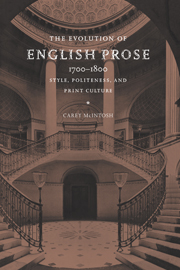Book contents
- Frontmatter
- Contents
- Preface
- 1 The ordering of English
- 2 Literacy and politeness: the gentrification of English prose
- 3 Testing the model
- 4 Loose and periodic sentences
- 5 Lofty language and low
- 6 Nominal and oral styles: Johnson and Richardson
- 7 The New Rhetoric of 1748 to 1793
- 8 The instruments of literacy
- 9 Politeness; feminization
- 10 Style and rhetoric
- Epilogue: language change
- References
- Index
Epilogue: language change
Published online by Cambridge University Press: 18 December 2009
- Frontmatter
- Contents
- Preface
- 1 The ordering of English
- 2 Literacy and politeness: the gentrification of English prose
- 3 Testing the model
- 4 Loose and periodic sentences
- 5 Lofty language and low
- 6 Nominal and oral styles: Johnson and Richardson
- 7 The New Rhetoric of 1748 to 1793
- 8 The instruments of literacy
- 9 Politeness; feminization
- 10 Style and rhetoric
- Epilogue: language change
- References
- Index
Summary
To what extent can the changes described in this book be thought of as language change? Should they be counted as data in a general theory of what happens to languages over time?
Our answer to these questions will depend in part on how we define language. If English, the language, is conceived as a mass noun, as a single system of verbal communication, then the ordering of English in the eighteenth century did not change that system much. Compared to the changes in English vowels after Chaucer, compared to the loss of Old English inflections, or to the emergence of modern English auxiliary verbs, what happened to English prose between 1700 and 1800 seems minor and peripheral. But if we think of “English” as a count noun, as a great bundle of different systems of verbal communication, written as well as spoken, with its various strands sortable by region, social class, age, gender, genre, and occasion, then the ordering of English can hardly be ignored. It affected syntax, semantics, word order, vocabulary, style. It introduced new conventions and rules for polite and for utilitarian prose, for the genres preferred by women and men of sensibility, for dictionaries and for political tracts. The number of strands written in formal English multiplied exceedingly. Strands of “low” English, the language written by Swift and Arbuthnot and Ward for satire and scurrility, dwindled in number as the century wore on.
The only place these changes have been observed, of course, is in written texts. One wonders how “ordered” spoken English can possibly be, in any age.
- Type
- Chapter
- Information
- The Evolution of English Prose, 1700–1800Style, Politeness, and Print Culture, pp. 235 - 238Publisher: Cambridge University PressPrint publication year: 1998



